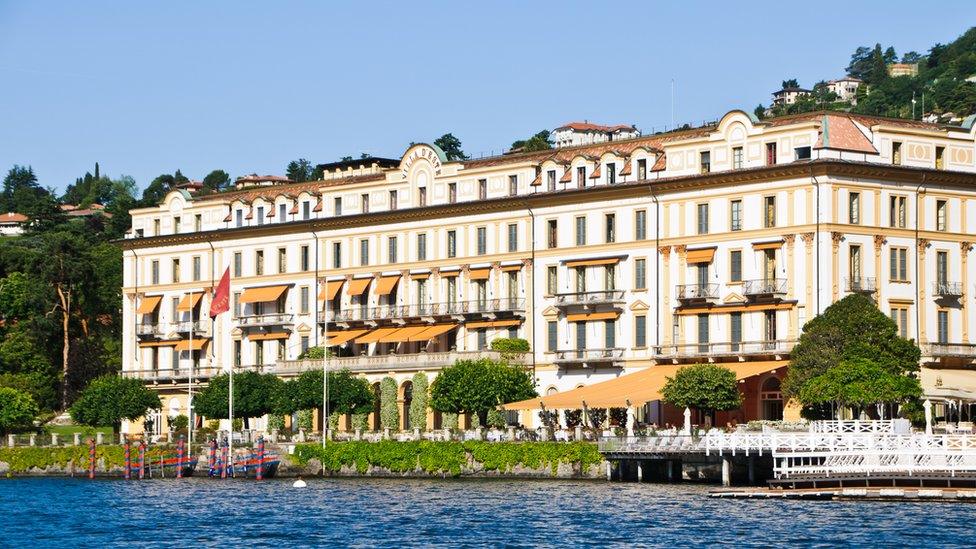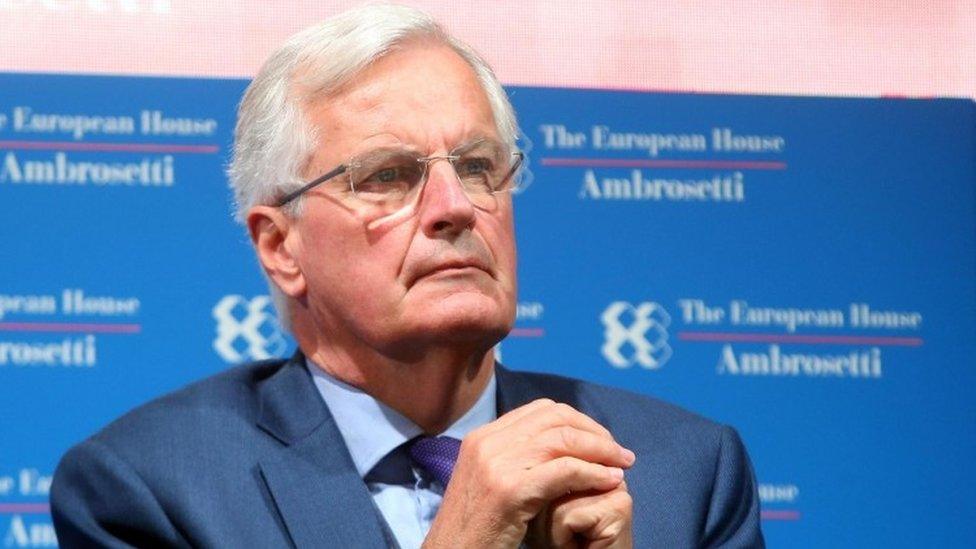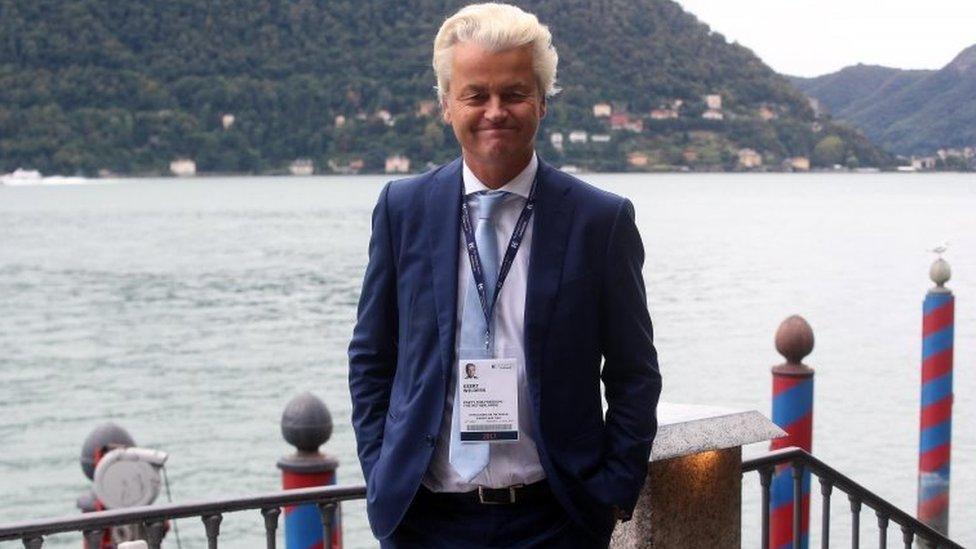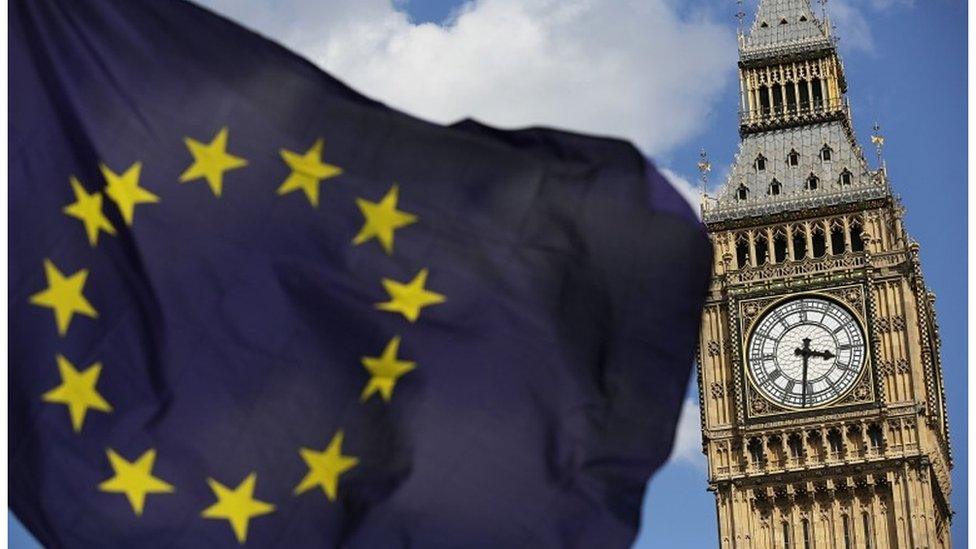Brexit: A lakeside view of Barnier's tough talk
- Published

It's a pretty place for some very hard talking by the EU's man in charge of Brexit talks.
The stately hotel the Villa d'Este, on the shores of magnificent Lake Como replete with baroque chandeliers, statues of nymphs and marble columns is not a hard sell.
No wonder former prime ministers, current ministers, US senators and European commissioners are happy to mingle under the watchful eye of the dozens of varieties of Italian police, some complete with sabres and tall plumed hats, at this high powered forum of the Italian think tank Ambrosetti - The European House.
They are the European elite - and feel their project is in remission. Over the weekend there's been torrential rain and thunder but now Lake Como's waters are only slightly choppy - a timely European metaphor.
This time last year, the subject for discussion here was the possibility of the disintegration of the EU. Brexit and Trump were feared as harbingers of nationalists taking power across Europe. It didn't happen in the Netherlands. Then it didn't happen in France. Now they are sure it won't happen in Germany this autumn and fairly confident it won't happen next spring in Italy either.
The mood could be best summed us as 'phew!' Perhaps the tone was set by one prominent guest who, in a voice full of passion, spoke of the EU as the greatest experiment in history - a club which ensured peace and prosperity.
His voice rising, with an orator's power, he said he was born in the 1970s and had known only peace. But his father was a child of the 1930s - he remembered war, remembered American soldiers bringing the new tastes of freedom and chocolate to a ravaged continent. His grandfather too had known war, and his great-grandfather, and his great-great-grand father. That was why now he said Europe was a synonym for peace.
In this telling of the story the UK had only a bit part, hardly mentioned except as one of the issues still haunting the Continent: the refugee crisis, the legacy of economic crisis, terrorism and Brexit.
This view from the lakeside goes a long way to explain the position of the conference's star turn, the EU's chief Brexit negotiator, Michel Barnier.
His purpose at the conference was, seemingly, not to rile British politicians or throw some red meat to the British press, but instead to start building a solid foundation for the EU for life after Brexit, to put the past behind it, to make it a singular earthquake not the remaking of an entire landscape.
His opening statement was not the most newsworthy but central to his purpose. He said his first principle was that the future of Europe is more important than Brexit. Far more important.

Michel Barnier said he wanted to teach the British people and others what leaving the EU means
Indeed that appears to be the view of most EU leaders, that Britain - having made a rather strange decision - must go now and try not to slam the door.
Although the EU is often portrayed in the UK as a monolith run by faceless bureaucrats, actually policy is usually a fudge between the competing interests of left and right, West and East, small and large, North and South and so on.
The unity over Brexit is fairly remarkable and Mr Barnier will hold tight to his mandate to make sure it does not shatter. He's also well aware that while French and Dutch voters didn't go the whole hog, the hard right strengthened its position and those very critical of the EU consensus are in power in Poland and Hungary.
He said that any adverse impact on the UK is not a punishment in itself but a logical consequence of decisions made by the British voters and subsequently by the British government, and he intends to educate people about that.
This position has two parts. One, being out of the EU cannot be as good as being in the club. And secondly, the separate choice to leave the single market has even more consequences.
On free trade, Mr Barnier said the 60 or so such deals negotiated by the EU in the past were a result of a slow process of countries converging, coming together, with the EU.
Some in the UK argue that means a free trade deal for us should be easy - as we have been converged for decades. Mr Barnier said that is not the point - the UK has deliberately chosen now to diverge after 40 years together and the EU needs to know how wide the new gap will get.
Does it imply breaching rules of the single market about workers' rights? Environmental standards? Undercutting tax costs? Will a deal for Toyota mean a break with state aid rules? He wants guarantees that won't happen.
Mr Barnier said he wanted to teach the British people and others what leaving the single market means, hence his reference to being a teacher, a pedagogue.
It was notable that he singled out one person by name, the leader of the Eurosceptic, right-wing Dutch Freedom Party, Geert Wilders, who wants the Netherlands to follow the UK out of the EU. He said the "education" was for him and those of a similar mind.

Dutch Euro-sceptic Geert Wilders, had some choice words for Mr Barnier
I asked Mr Wilders what he made of this.
"Mr Barnier who is, of course, a person I respect, is talking a lot of nonsense," he said.
"I am a politician and I asked a British institution to make a survey about what would happen if the Dutch would leave the EU. They came up with a result which proved it would hurt, like it is hurting Britain in the short term, but in the long run after three or 4 years our GDP would grow by more than 10%. There are many chances so Mr Barnier will have to look in the mirror if he wants an education."
But Mr Barnier is probably the sort of man who only looks in the mirror with a certain sense of satisfaction.
Using the contents of their well coiffured grey heads, few in the EU leadership want a bad relationship with the UK. They want a firm foundation for a good and inevitably close alliance. But both their hearts and their heads tell them anything that encourages further fracture of a project that is still very fragile, anything that looks like suggesting leaving the EU is a primrose path rather than a road to possible perdition, is a non-starter.
Michel Barnier concluded by pointing out again that he was, like Theresa May, a walker, a mountaineer used to taking one step after another, watching out for problems but always with his eyes fixed on the peaks.
The EU is determined that it will not stumble just because one member of the team is giving up on getting to the summit, particularly when it thinks that member never really believed in the sunny uplands in the first place.
- Published3 September 2017
